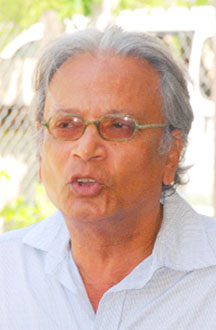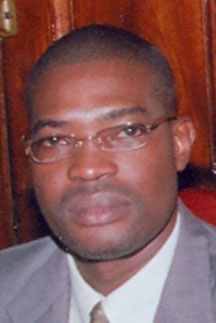Representatives of APNU and the AFC on Friday said they favour a ‘closed’ list system to select their representatives for the National Assembly so that the electorate would know for whom they are voting.
The ‘open’ list system currently being used, allows party leaders to select Mem-bers of Parliament from the list but with a ‘closed’ list, seats are allocated in the order that names are listed. APNU’s Prime Ministerial candidate Rupert Roopnaraine told a Facing the Future (FtF) forum that while it has not been decided as yet how the coalition’s representatives would be chosen, it would be logical for them to have a closed list.
The AFC’s David Patterson said that the party has passed a resolution whereby their list should be closed but he pointed out as well that there have been internal debates with regards to various issues regarding the list and so they will submit their names for the upcoming election in alphabetical order. However, he said, internally members will know that there is a priority system for the selection of their representatives.

There have been arguments in favour of parties adopting a ‘closed’ list system so that representatives would be accountable to their constituencies. Guyana‘s 65-seat National Assembly allows for 25 representatives from geographical constituencies but these representatives do not have to reside in those areas, and 40 representatives to be extracted from the party’s list.
Roopnaraine pointed out that electoral reform pledges have not been totally carried out with the “temporary” system used for elections since 2001 still in place. In giving the background of the current system to the sparsely attended forum held at the Demerara Life building on Robb Street, he urged that political parties be encouraged to put in their programmes or manifestos, completion of electoral system reforms in time for the next elections.

Speaking specifically on the system to be used by APNU, he noted that there are seven parties in the partnership and while they are yet to decide on how representatives will be chosen, there is a good argument for APNU to present their list “in a manner in which people know for whom they are voting.” The veteran politician said that APNU has a particular setup and will try to tackle any obstacles by discussion and consensus. Overall, he noted, there is a need for a mechanism where candidates can speak to their constituencies and “get some sort of approval.” The party wants an electoral system where the seats allocated are primarily constituency based, he said.
Meanwhile, Patterson outlined the process by which a representative of the AFC is chosen with there being several stages and screening processes. The AFC also has some broad guidelines with regards to gender, social consciousness, moral conduct, among others, he said.
Patterson while noting that the party has passed a resolution with regards to a closed list said the difficulty with regards to this priority system is that a party does not know how many seats it will get. He said that with regards to gender balance, the female members of the party objected and other avenues were examined but it was eventually decided that they will comply with Guyana Elections Commis-sion regulations and compile a list alphabetically but internally, the priority of representatives will be known.
The PPP and TUF were also invited to the forum but did not attend.
At the end of the presentations by the two representatives, discussions swirled around the “cult of fear” in Guyana with regards to persons joining the lists of political parties. It was stated that one of the major obstacles for suitable persons coming forward to run for public positions was the fear of victimization.
Co-president of the Guyana Human Rights Asso-ciation Mike McCormack said that the majority of Guyanese are “passive” politically, not because they do not care but because they fear victimization. He noted too that civil society has fragmented itself by the “virus of ethnic manipulation” but also has to recognize that there are faults in their organizations as well that deter people from becoming active in public life.




